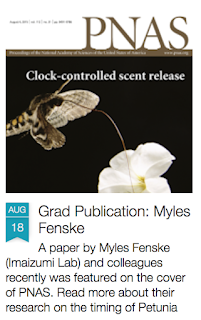We’re wrapping up a great academic year here, with commencement at the end of this week (can’t wait for wizards robes!) and it’s a great time to celebrate the growth of the SciPos community and the accomplishments of this year.
In the past academic year, SciPos has grown to an average of 3,000 views per month, and has nearly topped 100,000 views since its launch in October, 2011! This growth is due entirely to the excellent content generated by our graduate students. And we had the opportunity to recognize those contributions this year at our departmental BBQ. Incidentally, this BBQ was our opportunity to say a final goodbye to the Botany greenhouse, which will be taken down to make space for the department’s new building, including a new greenhouse.
So without further ado, announcing this year’s winners of the SciPos Awards:
Most Popular Post
Brandon Peecook

In which Brandon documents the legacy of successful #scicomm from our graduate students, and in which Alex Lowe uses colorful euphemisms to describe ocean acidification.
It is also worth noting that, though Brandon’s was the most popular post by a single author, the most popular post of all over the past year was Ada Lovelace Day, so special thanks go to Hilary Hayford, Marie Clifford, Leander Love-Anderegg, Audrey Ragsac, & Meera Lee Sethi for their contributions!

Best Breakout Contribution
Myles Fenske
Grad Publication: Myles Fenske and Nocturnal [scent] Emissions
This award was judged by a panel of independent science communication professionals. Myles, in his first full-length contribution to SciPos, tells us why petunias need clocks. The judges commented that Myles’ post had an excellent combination of humor and accessible scientific information, both key components to good science communication.
Honorable mention in this category goes to Leander Love-Anderegg and Mo Turner who were also highly rated by the judges.
Most Prolific Contributors
Alex Lowe & Yasmeen Hussain

These two were always ready with a post or to support a group post, and were tied for the most contributions. Read Alex’s description of a new field course in marine biology and Yasmeen’s very practical advice on how to tame your inbox. They also contributed photos and content to numerous group posts: here, here and here. They are also active promoters of the work on Twitter and you should follow them: (@h2_Lo and @hyasmeenh). These are the engines that keep this train a rollin’!


